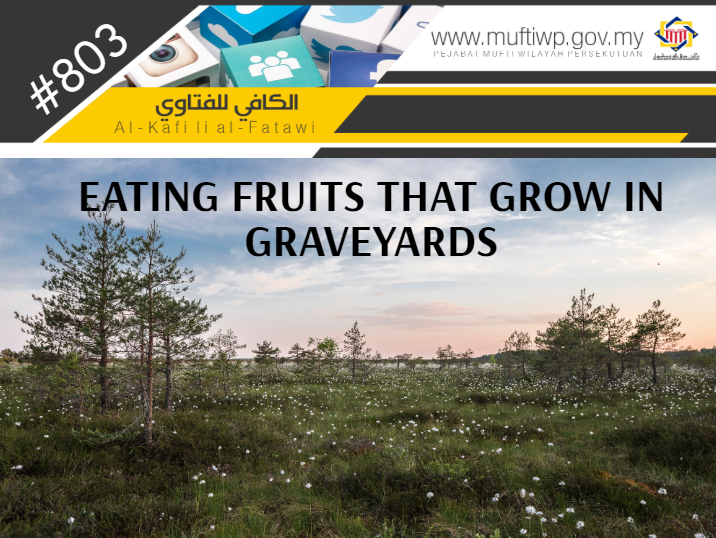Question:
Assalamualaikum. What is the ruling of eating fruits that grow in graveyards?
Answer:
Alhamdulillah, praise and thanks to Allah for the countless blessings He has blessed us all with. Blessings and salutations to the Prophet Muhammad PBUH, his wives, his family, companions and all those that follow his teachings to the day of judgement.
Generally, graveyards in Malaysia is planted with fruit trees, especially in provincial regions. An issue arises, who is the owner of the fruits and what is the ruling if someone eats the fruits that grow in these graveyards?
Here we state two situations and the ruling for them:
First, it is permissible to eat fruits that grow in general waqf graveyards. This is stated by Syeikh Zainuddin al-Malibari in Fath al-Mu`in:
ثمر الشجر النابت بالمقبرة المباحة مباح وصرفه لمصالحها أولى
“Fruits that grow in graveyards (which status is waqf or a given land for the use of Muslims’ graveyard) are permissible (halal to be eaten) and if it is used to fund the necessity of the graveyards, then this is prioritized.”
Second, if the trees grow on private graveyards such as the graveyard of the royals or certain families and not a waqf or given land, then the yield of the trees is owned by the landowner of the graveyard. People are prohibited from taking anything from the land, except with the permission of the landowner and if someone took something from it, then it is his obligation to replace whatever he has taken. This fact is stated by Syeikh Abu Bakar al-Dimyati when he commented on the above-stated phrase from Fath al-Mu`in:
وخرج بها: المملوكة، فإن ثمر الشجر النابت فيها مملوك أيضا، وقوله مباح، خبر ثمر، أي فيجوز لكل أحد الأكل منه
“it is no longer permissible if the land is owned by someone (not a waqf or given land). However, if a landowner gives permission to eat the fruits from the planted tree, then it is permissible (halal) for whoever wishes to eat them.” Refer I`anah al-Talibin (3/261)
Hence, if the landowner gives permission and lets the tree to be of benefit of others, then this is prioritized, for the rewards of this charitable act is continuous until the Day of Judgement.
From Abu Hurairah RA, the Prophet PBUH said:
إِذَا مَاتَ الإِنْسَانُ انْقَطَعَ عَنْهُ عَمَلُهُ إِلاَّ مِنْ ثَلاَثَةٍ إِلاَّ مِنْ صَدَقَةٍ جَارِيَةٍ أَوْ عِلْمٍ يُنْتَفَعُ بِهِ أَوْ وَلَدٍ صَالِحٍ يَدْعُو لَهُ
“When a man dies all his good deeds come to an end except three: Ongoing charity (Sadaqah Jariyah), beneficial knowledge and a righteous son who prays for him.”
Sahih Muslim (1631)
From Jabir RA, the Prophet PBUH said:
مَا مِنْ مُسْلِمٍ يَغْرِسُ غَرْسًا، أَوْ يَزْرَعُ زَرْعًا، فَيَأْكُلُ مِنْهُ طَيْرٌ أَوْ إِنْسَانٌ أَوْ بَهِيمَةٌ، إِلاَّ كَانَ لَهُ بِهِ صَدَقَة
“There is none amongst the Muslims who plants a tree or sows seeds, and then a bird, or a person or an animal eats from it, but is regarded as a charitable gift for him.”
Sahih al-Bukhari (2320)
The landowner could also let others benefit from the fruits growing on his land and make it a charitable act on behalf of his deceased parents or heirs.
A companion of the Prophet PBUH, Sa’ad bin ‘Ubadah RA has just lost his mother and asked the Prophet PBUH: "My mother died, will it benefit her if I give in charity on her behalf?" The Prophet (ﷺ) replied in the affirmative. The man said, "I have a garden and I make you a witness that I give it in charity on her behalf."
Sahih al-Bukhari (2756)
To conclude, it is permissible and halal for people to eat fruits that grow in public graveyards, but in private graveyards, it depends on the permission of the landowner. Hopefully, this explanation will answer the question.
Wallahua’lam.


